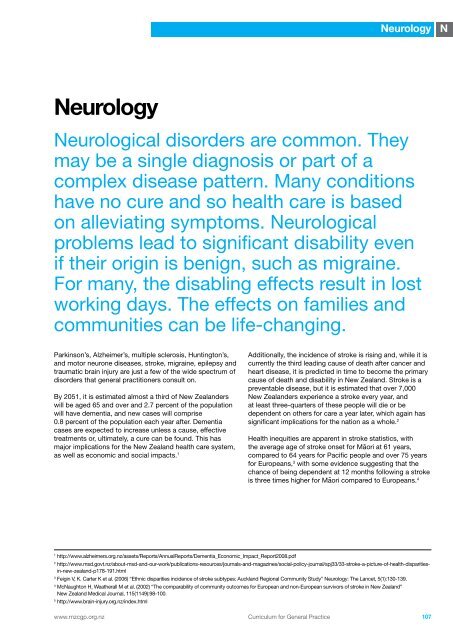Curriculum for General Practice - The Royal New Zealand College ...
Curriculum for General Practice - The Royal New Zealand College ...
Curriculum for General Practice - The Royal New Zealand College ...
You also want an ePaper? Increase the reach of your titles
YUMPU automatically turns print PDFs into web optimized ePapers that Google loves.
Neurology<br />
N<br />
Neurology<br />
Neurological disorders are common. <strong>The</strong>y<br />
may be a single diagnosis or part of a<br />
complex disease pattern. Many conditions<br />
have no cure and so health care is based<br />
on alleviating symptoms. Neurological<br />
problems lead to significant disability even<br />
if their origin is benign, such as migraine.<br />
For many, the disabling effects result in lost<br />
working days. <strong>The</strong> effects on families and<br />
communities can be life-changing.<br />
Parkinson’s, Alzheimer’s, multiple sclerosis, Huntington’s,<br />
and motor neurone diseases, stroke, migraine, epilepsy and<br />
traumatic brain injury are just a few of the wide spectrum of<br />
disorders that general practitioners consult on.<br />
By 2051, it is estimated almost a third of <strong>New</strong> <strong>Zealand</strong>ers<br />
will be aged 65 and over and 2.7 percent of the population<br />
will have dementia, and new cases will comprise<br />
0.8 percent of the population each year after. Dementia<br />
cases are expected to increase unless a cause, effective<br />
treatments or, ultimately, a cure can be found. This has<br />
major implications <strong>for</strong> the <strong>New</strong> <strong>Zealand</strong> health care system,<br />
as well as economic and social impacts. 1<br />
Additionally, the incidence of stroke is rising and, while it is<br />
currently the third leading cause of death after cancer and<br />
heart disease, it is predicted in time to become the primary<br />
cause of death and disability in <strong>New</strong> <strong>Zealand</strong>. Stroke is a<br />
preventable disease, but it is estimated that over 7,000<br />
<strong>New</strong> <strong>Zealand</strong>ers experience a stroke every year, and<br />
at least three-quarters of these people will die or be<br />
dependent on others <strong>for</strong> care a year later, which again has<br />
significant implications <strong>for</strong> the nation as a whole. 2<br />
Health inequities are apparent in stroke statistics, with<br />
the average age of stroke onset <strong>for</strong> Māori at 61 years,<br />
compared to 64 years <strong>for</strong> Pacific people and over 75 years<br />
<strong>for</strong> Europeans, 3 with some evidence suggesting that the<br />
chance of being dependent at 12 months following a stroke<br />
is three times higher <strong>for</strong> Māori compared to Europeans. 4<br />
1<br />
http://www.alzheimers.org.nz/assets/Reports/AnnualReports/Dementia_Economic_Impact_Report2008.pdf<br />
2<br />
http://www.msd.govt.nz/about-msd-and-our-work/publications-resources/journals-and-magazines/social-policy-journal/spj33/33-stroke-a-picture-of-health-disparitiesin-new-zealand-p178-191.html<br />
3<br />
Feigin V, K. Carter K et al. (2006) “Ethnic disparities incidence of stroke subtypes: Auckland Regional Community Study” Neurology: <strong>The</strong> Lancet, 5(1):130-139.<br />
4<br />
McNaughton H, Weatherall M et al. (2002) “<strong>The</strong> comparability of community outcomes <strong>for</strong> European and non-European survivors of stroke in <strong>New</strong> <strong>Zealand</strong>”<br />
<strong>New</strong> <strong>Zealand</strong> Medical Journal, 115(1149):98-100.<br />
5<br />
http://www.brain-injury.org.nz/index.html<br />
www.rnzcgp.org.nz<br />
<strong>Curriculum</strong> <strong>for</strong> <strong>General</strong> <strong>Practice</strong><br />
107

















